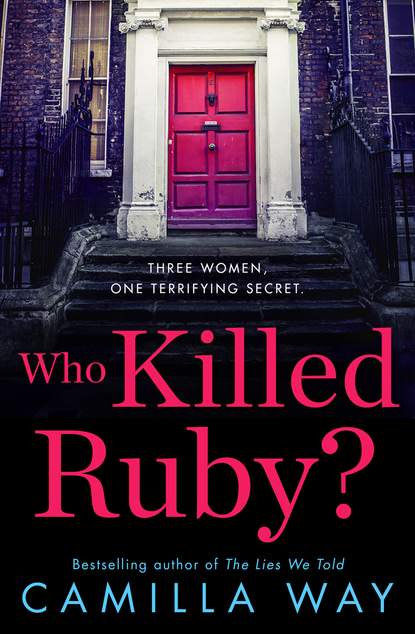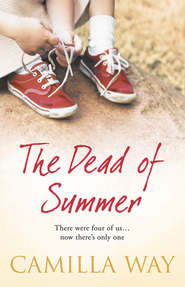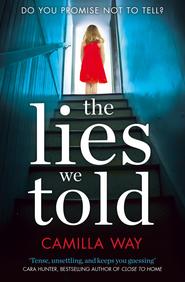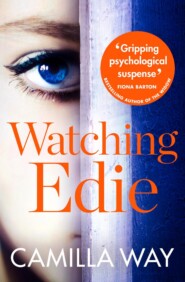По всем вопросам обращайтесь на: info@litportal.ru
(©) 2003-2025.
✖
Who Killed Ruby?
Автор
Год написания книги
2019
Настройки чтения
Размер шрифта
Высота строк
Поля
In the kitchen, Samar is telling Vivienne and Ted a story about a well-known theatre actress he’d once worked with. A long career in stage management has provided him with a seemingly endless supply of salacious gossip, but even by his standards, today’s tale is pretty hair-raising. ‘But I mean, how is that even possible?’ Viv muses when he’s finished. ‘And with a Great Dane, for Christ’s sake?’ She sighs wonderingly and pours Samar a glass of wine, then offers the bottle to Ted. ‘How about you, Ted? You joining us today?’
‘Oh, better not, I’m on a diet.’ He pats his round stomach regretfully.
When Viv turns back to Samar she’s surprised to see the wistfulness in her friend’s eyes as he gazes over at Ted. It occurs to her suddenly that they’d both been quieter than usual today and she wonders if they’ve had a row. Samar has always been uncharacteristically unforthcoming about their relationship. When he’d first introduced him to her she’d been dubious; Ted hadn’t seemed the most obvious match for her friend. While Samar was skinny as a whippet, habitually dressed in black and had a sense of humour verging on depraved, Ted had a lilting Welsh accent, was balding and overweight, and favoured comfortable clothes in various shades of beige. He’d always struck her as a bit staid for someone as extrovert as Samar.
She also couldn’t help feeling that Ted didn’t entirely approve of her and Samar’s close friendship. He often avoided joining them whenever they got together, sending Samar with an apologetic excuse that never quite felt authentic. When he did appear she sometimes had the nagging sense that he was there under sufferance and couldn’t help wonder if he might not like her very much. She takes a sip of her wine and tries to push the thought away. Samar is clearly head over heels, things have moved fast between them and on the whole they both seem happy together. The slight atmosphere today is probably down to a lover’s tiff, she decides, as she catches Samar’s eye and smiles. She gets to her feet and, sliding the chicken from the oven, bastes it with sizzling fat before slamming it back in. ‘So, tell me about this trip to Paris,’ she says to Ted. ‘Can’t believe you’re whisking him off again.’
‘What can I say? I like to spoil him.’
‘God, you lucky sod,’ she says to Samar enviously.
Ted shakes his head. ‘I’m the lucky one.’ At this she sees Samar beam with pleasure, whatever tension there’d been between them apparently forgotten.
Samar and Viv had met aged fourteen when he joined Deptford Green Comprehensive in Year 9. Both of them had been easy targets for the school’s bullies – Vivienne for wearing handmade clothes courtesy of Soren, having her hair cut by Hayley with the kitchen scissors, and for living in a house with ‘a bunch of weirdo lezzers’ that ‘didn’t even have a telly’, and Samar for being Pakistani, gay and seemingly unapologetic about both. Together they’d bunk off to hang out in Nunhead cemetery where they’d sit within its vast, overgrown sprawl amidst the broken angels and mausoleums, smoking spliffs pilfered from Hayley’s stash and pouring over copies of The Face and i-D, dreaming about what better, cooler, well-dressed people they’d be when they grew up.
Samar never said much about his home life but it hadn’t taken Viv long to get the gist – three sisters and an unhappy mother in a two bedroom flat in New Cross, a father who was perpetually drunk and full of a nameless rage that he liked to take out on his skinny, rebellious son. Samar had loved the commune, loved Stella with a fervour close to hero worship. He’d become one of her original devotees, first in the long line of waifs and strays she’d counsel over the years, and even now remained one of her most ardent fans.
Aged seventeen, in the mid-nineties, they’d discovered London’s gay scene, embracing every bar and club the city had to offer, returning faithfully every Saturday night to be transported to a world where neither Ruby’s death nor Samar’s dad could follow them.
When, after barely scraping through her A-levels, Vivienne inherited her grandparents’ money, life had been wonderful at first. Viv found them a flat to rent in Deptford and she and Samar partied by night and slept by day, their lives an exciting whirl of recreational drugs, booze and men. But then, suddenly, things had changed. Samar landed his dream job as a stagehand in the West End, and didn’t want to go out quite so much any more. He began to nag Viv about the drugs and drink she was consuming, the strange men waking up in their flat every weekend. In turn, she thought he was a boring, nagging hypocrite who needed to lighten up. Eventually, they’d had a major falling out. Samar had moved out of the flat and Viv had carried on partying without him.
And then, entirely out of the blue, or so it had seemed at the time, Vivienne, now twenty-two, had fallen into a darkness so thick and bottomless that she could find no way of dragging herself out. For weeks she’d stayed at home, sinking lower and lower, a sadness pressing on her chest that made her unable to eat or wash or countenance the world outside her flat. When she slept her dreams were plagued by horrors from which she’d wake breathless with fear, tears in her eyes, her sister’s name on her lips.
Finally, wanting to build bridges and concerned when she didn’t answer her phone, Samar had called around, using his old key to gain entry when there was no response to his knock. Within minutes he’d bundled Viv into a cab and taken her straight to Stella’s, and over the next year the two of them slowly helped put Vivienne back together. When Viv thinks back to that time she shudders to think what would have happened if Samar hadn’t rescued her, if her mum hadn’t been there to take charge.
It was a time in her life she never wanted to return to, especially since having Cleo. Sometimes though she feels the darkness like a black beast circling her, waiting for its chance to pounce. Only her need for alcohol remains from those dark days and nights of sex and booze and drugs; wine was the one thing she’d not managed to relinquish, not while her nightmares continued to haunt her.
The chicken out of the oven, Viv is about to call Cleo down to eat when Samar says quietly, ‘It’s the anniversary on Monday, isn’t it?’
She nods, touched that he remembers every year.
‘How’re you feeling?’
‘Oh, you know. I’ve no idea why I still get so upset every time. Why I can’t just move on. She died thirty-two years ago, for God’s sake.’
‘Have you never had therapy for it?’ Ted asks.
She glances at him. ‘No, but I’ve always had my mum to talk to, and you know how brilliant she is.’ Even as Viv makes this remark it occurs to her that Ted, in fact, hasn’t met Stella yet. Before he came on the scene she, Stella and Cleo would enjoy frequent Sunday lunches around at Samar’s flat, but that hadn’t happened in months. Again the worrying thought occurs to her that Ted, though perfectly polite to her face, might not quite approve of her and Samar’s closeness and she feels a lingering disquiet that the friendship that had survived since their schooldays might not endure if he tried to come between them.
But Ted merely nods. ‘Even so, maybe someone totally neutral wouldn’t be a bad idea.’
‘Oh, don’t bother,’ Samar tells him. ‘She won’t go. I’ve tried to talk her into it a billion times.’
Viv smiles and shrugs. The thought of talking to a stranger about her sister’s death has always made her feel intensely uncomfortable, though she’s not sure why. She’d been grateful that her mother had never insisted on it when she was young.
‘You sure you’re OK, though?’ Samar asks again, coming over and putting his arm around her.
She leans her head on his shoulder. ‘I hate this time of year.’
‘What you need is a bit of excitement in your life. How about that doctor guy from the café? Are you going to ask him out?’
She laughs. ‘No, Samar, I’m bloody not. For one thing, I don’t even know if he’s single.’
‘Well, get yourself on a few dating websites, then. It worked for me and Ted.’
‘Yeah,’ she says, ‘maybe you’re right.’ But her thoughts linger on the doctor, and she’s not sure what it is about him that intrigues her so, only that there’s something about his grave smile, the calm brown of his eyes that she can’t quite let go of.
Much later, after her guests have left and Cleo is sound asleep, Viv goes about turning off the lights and locking the front door. Outside, the November wind bounds and batters along the street, she hears a bottle rolling to and fro along the pavement, a dog’s distant bark. Before she goes to bed she glances in at Cleo sleeping before softly creeping away.
No matter how hard she tries not to think about it, her mind returns again and again to the day her sister died, a familiar niggling doubt worrying at the peripheries of her consciousness. This strange uncertainty is something that has dogged her all her life. Perhaps it was Jack’s continued assertion of his innocence – he had appealed three times against his conviction – or his family’s unwavering belief that she had lied, but she’s never quite been able to shake it off.
As she gets undressed she reminds herself of how badly Jack had treated Ruby, how both Morris Dryden and their neighbour Declan had said they’d seen him in their lane at the time of the murder. She reaches for her sleeping pills, wanting only oblivion. The right man had gone to prison; there could be no mistake.
She wakes to darkness, her head slow and foggy from the pill, to feel fingers gripping her shoulder and she jerks away in alarm.
‘Mum, wake up! Wake up, Mum, it’s OK, it’s only me.’
Sitting up, Viv gazes around her in confusion. ‘Cleo? What’s the matter?’
‘You were shouting in your sleep again.’
‘Oh, God, love, I’m sorry.’ She leans over and switches on the bedside light to find her daughter crouching by her bed, blinking in the sudden brightness.
‘It’s OK. You were really screaming. Are you all right?’
‘I’m fine. I’m sorry, darling. I’m OK.’
Cleo straightens and yawns, her face swollen with sleep. ‘Sounded like a bad one this time.’
‘It was. Thanks for waking me, I’m so sorry I disturbed you. Go back to bed. I’m fine.’
When Cleo leaves, Viv waits for her heart to cease its frantic hammering. The nightmare had begun the way it always did. She’s a child again, sitting in the living room while Ruby and Jack argue in the room above. A slow dread creeps through her. She knows that her sister is about to die but she’s unable to move a muscle, to do anything at all to stop it. What happens next always varies; occasionally she’ll go to Ruby’s bedroom to see a dark faceless figure standing over her sister’s body, sometimes she’ll run from the house knowing that her sister’s killer is on her heels, his hand reaching out to grab her.
In tonight’s dream though, just as she’d heard her sister’s scream she’d looked up to find their old neighbour, Declan Fairbanks staring in at her through the living room window. For a moment she’d held his pale blue gaze before being hit by the overwhelming rush of fear that had caused her to scream out so loudly that she’d woken Cleo – and probably half the street too.
It was not the first time she’d dreamt of Declan; he often appeared in her nightmares, always with an accompanying feeling of disquiet. Sometimes she’ll dream that Morris Dryden is there too, his happy grin and rosy cheeks incongruous with her terror.
This, of course, is not surprising, tied as Morris and Declan are to that day, their witness statements playing a key role in Jack’s conviction. But she’s noticed lately that her unease when she dreams of Declan is laced with something else – a queasy kind of revulsion. She remembers little about him: a rather severe-looking man in his fifties, dark hair peppered with grey, very striking pale blue eyes. She has a dim recollection of him shouting at her once for kicking a ball at his window. Perhaps that’s where her aversion springs from, the childish memory of being chastised mixed with the general horror of Ruby’s death. Perhaps that was all it was.
For a long time she lies staring at the ceiling, only the street lamp below her window casting its weak glow upon the blackness. The wind has stopped; the world outside is silent now. But when at last she starts to drift off back to sleep, a sudden noise from the street jerks her back to full consciousness. What was that? Her window is open a crack and she lies very still, listening, until another sound from outside has her sitting up, suddenly alert. There it is again: feet shuffling on the pavement below, then the sound of someone clearing their throat. Her nostrils prickle as she detects the faint trace of cigarette smoke. Slipping from her bed she creeps to the window and looks out.
There is someone standing by her gate and she feels a jolt of shock when she realizes that it’s her mother’s boarder, Shaun. He’s looking away down the street, the red glow from his cigarette rising and falling as he takes a drag, and she quickly steps back from the street lamp’s glare. What on earth? She waits, heart pounding, until she hears him move off, his footsteps on the pavement gradually retreating, and when she dares to peer out once more she sees him rounding the furthest corner, before finally disappearing from view.
6 (#ulink_3f3307ef-e441-5db1-acec-461c47049bb4)
Vivienne’s disquiet continues throughout the weekend, no matter how hard she tries to distract herself. What the hell had Shaun been playing at? Was he stalking her now? The thought is as baffling as it is frightening. She knows that all of her mother’s guests are carefully vetted before they’re sent to her; that Stella’s never given anyone with a history of violence – or any other serious crime, for that matter – yet what did either of them really know about him? When her alarm wakes her on Monday morning these questions are still weighing heavily upon her as she heads for the shower.
Thirty minutes later she and Cleo hurry out of the house only for Viv to come to an abrupt halt before the door has closed behind them. ‘I’ve forgotten my phone. Get in the car,’ she says, handing Cleo the keys and turning back inside. ‘I’ll give you a lift to the bus stop.’ But when she reappears twenty seconds later, it’s to find Neil and Cleo in deep discussion at the gate.









